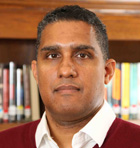World Politics and Wise Leadership
Politically, we live in divided times. This is the case nationally and globally. Nationally, whether it’s a woman’s right to choose, gun rights, race relations, or migration, it’s challenging to find common ground. If anything, there seems to be a chasm between the political left and political right, almost as if we’re two peoples divided in our core beliefs. Globally, the international community faces a number of complex threats. The war in Ukraine continues, as do events in the Middle East. In the years ahead, climate change will push millions of refugees from the Global South upwards. Coupled with a rise in nationalism, this might lead to a perfect storm in which more authoritarian leaders from the Global North consolidate their power by scapegoating the other--especially the vulnerable migrant. With technological advances and a surging gap in global economic equality, we stand to see a world in which the “haves” and “have nots” are being driven further apart. We stand to see a world torn apart if current trends continue.
-
Coursework Overview
The coursework for this Endeavor community involves taking a one-unit course in the fall semester and a half-unit course in the spring semester, both taught by Dr. Datta.
Fall 2024 Semester Spring 2025 Semester PLSC 250: International Relations (1 unit) IDST 190: World Politics and Wise Leadership Seminar (.5 unit) PLSC 250 satisfies the social inquiry (AISO) area
IDST 190 is a half-unit project based course part of the Endeavor program.
-
Specific Course Information
PLSC 250: Introduction to International Relations
This course takes a cue from Cornell West, who said, “Let the phones be smart. We have to be wise and aspire to integrity.” In this course, we will look at international relations politics from the perspective of wise and mindful leadership. Students will be enrolled in Dr. Datta’s course, PLSC 250: Introduction to International Relations (IR). Students will learn core concepts of IR theory as well as follow and contextualize world events from an IR lens. Another focus of the class will be to critique decisions in global leadership and explore how much, and in what ways, our local and national leaders are wise and mindful. More broadly, this course seeks to ask: (1) What does being a wise and mindful leader mean? (2) How can students learn from the mistakes of world leaders, past and present, as they consider leadership positions after graduating from The University of Richmond? (3) How can students wisely apply insights from IR theory as they consider the plethora of global challenges we face, from issues of national security (e.g., fighting the war on terrorism) to issues of global security (e.g., contending with the effects of climate change, understanding the impact of mass migration from the Global South to the Global North). Students will learn how to distinguish mindful from unmindful leadership and how to meditate and develop a daily meditation practice.
This course will meet all the course requirements of PLSC 250: Introduction to International Relations, which counts for the political science and global studies majors, and satisfies elective requirements for other programs at the University of Richmond.
IDST 190: World Politics and Wise Leadership Seminar
For the spring semester, students will work in small groups, engaging in 15-20 hours of community service (on or off campus) learning more about the importance of service learning in obtaining a good liberal arts education. Guest speakers from the Greater Richmond Area will visit the class to discuss the wise and mindful leadership theme.
-
Faculty Information

Dr. Monti Datta is Associate Director of Political Science. -
Endeavor Short Course Information
As part of the Endeavor program, you will participate in the popular Endeavor Pre-Orientation program, where you will take a short course led by Dr. Datta.
Short Course Description: The Wise and Mindful Leader
For the Roadmap Short Course, students will learn how to meditate, exploring various techniques, including walking meditation, guided breathwork, mindful eating, and mindful movement. Students will learn the skills needed to develop and sustain a meditation practice for their college career.